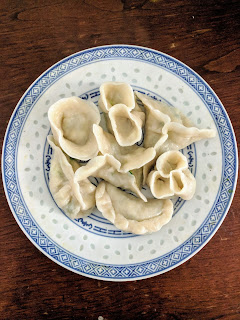Zhang Zhongjin and the Invention of Dumplings
What is your favorite Chinese cuisine? I bet half of the readers would say, "Dumpling!" My boss ordered dumplings for every party. My western colleagues asked me to buy frozen dumplings for them from Chinese grocery stores. After my parents-in-laws moved to live with us, my husband begged them to make authentic Shandong dumplings (from scratch) no less than twice a week.
Dumplings, wrapped in dozens of ways with various stuffings, can be fried, steamed, boiled. They have been comforting and healthy food ever since a Chinese medicine doctor, Zhang Zhongjin (張仲景), invented them 2000 years ago.
Zhang Zhongjin was the most exemplary Chinese physician in treating contagious diseases. During his childhood, he lost half of his family members from plagues. He devoted the rest of his life researching preventions and treatments of infectious diseases. He diligently explored medical literature published before his time for ancient remedies. At the same time, he actively outreached to the countryside, collecting every piece of effective prescriptions from his peers. His masterpiece "Treatise on Cold Pathogenic and Miscellaneous Diseases" is a 16-volume book historically regarded as "Soul of Chinese Medicine."
How good was Zhang Zhaongjin's medicine practice? Another physician in his time, Huangpu Mi (皇甫谧), documented a case in the book "AB Canon of Acupuncture and Moxibustion (針灸甲乙經)." about Zhang Zhongjin diagnosing poet Wang Can (王粲).
Original text in Chinese:「仲景見侍中王仲宣時年二十餘,謂曰:君有病,四十當眉落,眉落半年而死,令服五石湯可免。仲嫌其言忤,受湯而勿服。居三日,見仲宣謂曰:服湯否?仲宣曰:已服。仲景曰:色候固非服湯之診,君何輕命也?仲宣猶不言。後二十年果眉落,後一百八十七日而死,終如其言。」
The poet was 20 years old when Zhongjin met him. Zhongjin stated, "You are ill. Your eyebrows will start to fall when you turn 40. Half a year after that, you will die. You can avoid this from happening if you take my medicine, Five Stone Soup." The poet was uncomfortable with this statement, so he accepted the medicine but did not drink it. After three days, Zhongjin saw the poet again, asking, "Did you take medicine?" The poet said yes. Zhongjin sighed, "From your complex, I can tell that you did not. Why don't you cherish your life?" The poet remained silent. After 20 years, the poet indeed started to lose his eyebrow. After 187 days, he died, like how Zhang Zhongjin predicted.
Chinese medicine focuses on prevention. The best doctors prevent people from getting ill by strengthening one's body with the right food, exercise, and lifestyle. The legend of dumplings was part of it.
In a cold winter, another plague hit Zhang Zhongjin's hometown right after people survived a famine. Malnutrition and the cold weather made the situation worse. Many people's ears festered because of frostbite. Zhongjin and his students set up general medicine tents with large stoves and pots. The medical practitioners minced lamb, chili pepper, ginger, and other herbs to improve blood circulation. Then they wrapped the mixture inside a wheat flour dough, shaped them into an ear shape, then boiled them in hot water. "Tender Ear Soup" was the name they gave to this recipe to cure festered ears.
For a whole month, they distributed "Tender Ear Soup" to the public for free. Two "Tender Ears" in a bowl of hot lamb soup per person per day. The soup warmed up one's body, increased blood circulation, and provided a perfect combination of nutrition to boost the immune system. After having "Tender Ear Soup" every day for weeks, most of the patients' festered ears healed. The plague was also gone. Since then, it became a tradition for the Chinese to make "Tender Ear" (嬌耳) every winter as disease prevention and celebration. As time went by, "Tender Ear" became "Dumpling Ear" (餃耳), then "Dumpling" (餃子).
Although the legend did not tell if dumplings indeed defeated the plague, we know that Zhang Zhongjin distributed food, treatment, and love in one bowl of dumpling soup. Next time you enjoy hot dumplings, maybe you will remember how a physician invented them and appreciate the wisdom and compassion in traditional Chinese culture.
Photo Credit: "Dumplings Wrapped in Seven Ways" by Wen Chen


Comments
Post a Comment